八下Unit 1导学案
人教版八年级下册英语导学案

Unit1 Will people have robots?Section A period 1 (1a-1c)主备人:曾丝秀审核人:初二英语备课组学习目标:1、学会拼写单词will,robot,everything,paper和won’t2、学会运用will 表示一般将来时和能用will和won’t写出表将来的句型3、创设情景,让学生简单预测自己的未来学习方法:Reading,Listening and writing学习流程及措施:一、预习自学(一)通过预习,完成下列单词和词组的拼写1、将、会;要________2、机器人_________3、每件事情______4、纸,纸张_______5、在人们的家里_____________6、有个机器人__________7、在家通过电脑学习__________8、活到100岁__________9、在五年后__________10、在纸上________(二)根据首字母及句意完成单词1)R______ can do many things for people.2) There are some pieces of p______ on the desk,and you can write on them.3) E_____ is ready .Let’s begin.4) He u____ a pen to write.5)There will be more and more tall b______ in our city.二、研讨一)通过预习完成下列句子1、人们家中将有机器人。
People _____- ______ ______ in their homes.2、人们将不再用钱,每样东西都是免费的People ____ _____ ______. Everything____ ______ _____.3、将来书只在电脑上出现,而不会在纸上.Books _____ ____ ______ on computer, not _____ ______.4、孩子们将不去上学,他们将在家中通过电脑学习。
英语新目标八年级下册unit 1 Will people have robots 课文及导学案

Unit 1 Will people have robots? 课文及导学案SECTION A1a SENTENCES1.People will have robots in their homes.2.People won‟t use money. Everything will be free.3.Books will only be on computers, not on paper.4.Kids won‟t go to school. They‟ll study at home on compute rs.5.There will only be one country.6.People will live to be 200 years old.1c PAIRWORKA: Will people use money in 100 years?B: No, they won‟t. everything will be free. Will people live to be 200 years old?A: Y es, they will.Grammar Focus—Will there be less pollution? —No, there won‟t. There will be more pollution.—Will there be fewer trees? —Y es, there will.—Kids won‟t go to school. Kids will study at home on computers.3aFive years ago, Sally was in high school. She played soccer. She had a cat.Today, Sally is in college. She plays the guitar. She has a dog.In five years, Sally will be a doctor. She will play tennis. She will have a car.SECTION B3aIn ten years, I think I‟ll be a reporter. I‟ll live in Shanghai, because I went to Sh anghai last year and fell in love with it. I think it‟s really a beautiful city. As a reporter, I think I will meet lots of interesting people. I think I‟ll live in an apartment with my best friends, because I don‟t like living alone. I‟ll have pets. I can‟t have any pets now because my mother hates different pets.I might even keep a pet parrot. I‟ll probably go skating and swimming every day. During the week I‟ll look smart and probably will wear a suit. On the weekend, I‟ll be able to dress more casually. I think I‟ll go to Hong Kong on vacation, and one day I might even visit Australia.SELF CHECK2 Predicting the future can be difficult. There are many famous predictions that never came true. Before 1929, there was no sound in movies. The head of one of the biggest movie companies in the United States predicted that no one would want to see actors talk. Of course, he was wrong! In 1977, the head of the largest computer company in the United States said, …“No one will want to have a computer in his or he r home.” He thought that computers would never be used by most people.SECTION 2 While Y ou ReadDo you think you will have your own robot?In some science fiction movies, people in the future have their own robots. These robots are just like humans. They help with the housework and do the most unpleasant jobs.Some scientists believe that there will be such robots in the future. However, they agree it may take hundreds of years. Scientists are now trying to make robots look like people and do the same things as us. Japanese companies have already made robots walk and dance. This kind of robot will also be fun to watch.But robot scientist James White disagrees. He thinks that it will be difficult for a robot to do the same things as a person. For example, it‟s easy for a child to wake up and know where he or she is. Mr. White thinks that robots won‟t be able to do this. But other scientists disagree. They think that robots will be able to talk to people in 25 to 50 years.Robot scientists are not just trying to make robots look like people. For example, there are already robots working in factories. These robots look more like huge arms. They do simple jobs over and over again. People would not like to do such jobs and would get bored. But robots will never get bored.In the future, there will be more robots everywhere, and humans will have less work to do. New robots will have many different shapes. Some will look like humans, and others might look like snakes. After an earthquake, a snake robot could help look for people under buildings. That may not seem possible now, but computers, space rockets and even electric toothbrushes seemed impossible a hundred years ago. W e never know what will happen in the future!语法精讲(一)一般将来时1.主语+am/ is/ are going to +动原do2.主语+助动词will+ do (若主语为第一人称,也可用I/ We + shall do)3.部分动词如:come, go, leave, move, start, arrive, fly等常用进行时结构be+ doing 表示将来;4.表示将要有……, 用:There is/ are going to be +主语+其他;或There will be +主语+其他;E.g.: People will have robots in the future.否:People robots in the future.一般疑问句:people robots in the future?回答:Y es, . / No, .划线提问:people in the future?同义句:People robots in the future.(二)many/ much—more—most 表数量多,可修饰可数名词复数或不可数名词few—fewer—fewest 表数量少,只修饰可数名词复数little—less—least 表数量少,只修饰不可数名词用上述词的适当形式填空:1.They’ll do their work well with money.2.There are / buildings in our city than their city.3.There will be pollution if we plant trees.4.There are too many people here. It’s too crowded.5.I feel better now.6.He’s new here. He has friends, does he?(三)alone: adj./ adv. 表示形体上“单独的,独自地”lonely: adj. 表示精神上“孤独的,寂寞的”1.She is afraid to go out at night.2.It’s hard for him to finish the work .3.She lives and that makes her feel sometimes.(四)except: prep. 除……之外;(不包含…)All the students finished the homework except Nick. (指Nick未完成作业)She goes to work every day except Sunday. (Sunday 除外)(五)It‟s +adj.+ for sb. to do…= 主语+find (think, believe…) it +adj. to do…对某人来说做…太…了E.g.: Maybe these children find it hard to think for themselves when they’re older.= Maybe it’s hard for these children to think for themselves when they’re older.基础夯实一.根据音标和句意拼写单词1.I think r will do housework instead of people.2.Money is important, but money isn’t3.He / / a letter to his brother yesterday.4.He is a worker. He works in a5.Don’t worry about me. I can look after / /.6.He is too young to himself.二、选择填空:1.I saw a boy when I walked along the river.A. swimB. to swimC. swimmingD. swims2.are going home on a train.A. Mr. TurnerB. Mr. Turner’sC. The TurnersD. The turners’3.All the fruit is free. Y ou can eat .A. as many as possibleB. as much as possibleC. as more as possibleD. as many as possibly4.We need time and freedom ourselves after whole day’s work.A. relaxB. relaxesC. relaxingD. to relax5.We find easy to get along with him.A. isB. itC. thisD. that6.Wang Liqin the national team in 1998 and then he a lot of ping pong matches.A. joins; takes part inB. joins; took part inC. joined; takes part inD. joined; took part in7.People use money to buy food, books, bicycles and other things they need.A. a hundred ofB. hundreds ofC. two hundreds ofD. hundred of8.We’ll go for a picnic if it this Sunday.A. don’t rainB. doesn’t rainC. won’t rainD. isn’t raining9.Are you here on business or fun?A. inB. onC. atD. for10.The TV program was very and we all got .A. boring; boredB. bored; boringC. bored; boredD. boring; boring11.To be here at Christmas time is a dream that has .A. be trueB. comes trueC. come trueD. came true12.Please who broke the window.A. findB. look forC. look atD. find out13.I will see you on the moon .A. a dayB. every dayC. one dayD. everyday14.There will a concert in our city.A. haveB. hasC. isD. be15.—Do you like the city life or the country life?—It’s hard to say. In the city it is interesting, but in the country there is pollution.A. less; moreB. more; lessC. more; fewerD. much; much16.My life will be better than it is now.A. a lotB. a lot ofC. a fewD. more17.What will happen to our human 100 years from now?A. 100 years agoB. 100 years before nowC. since 100 years agoD. in 100 years18.This coat doesn’t fit him well, as he has a huge body and the coat is small.A. so; suchB. so; soC. such; suchD. such; so三、用括号内所给词的适当形式填空We can see robots in some places. There are robots 1 (work) in factories. They do simple jobs over and over again. People don’t want 2 (do) such jobs. In some restaurants, we can see robots 3 (say) hello to people or serving dishing. Japanese companies have already made robots (walk) and dance. It’s fun 5 (watch). In the future, there (be) more robots everywhere, and humans will have (little) work to do.四、句型转换1.There is going to be a new building here in 2 years. (同义句)There a new building here 2 years .2.She can sing the song in French. (同义句)She the song in French.3.It took her 500 yuan to buy the ticket. (同义句)She 50 yuan / the ticket.She 50 yuan the ticket.4.My parents will go to Beijing in two years. (对划线部分提问)your parents to Beijing?5.He seems to like this book. (同义句)he likes this book.6.Cities will be big and crowded in the future. (否定句)Cities very big crowded in the future.7.We’ll go out for a walk with you. (同义句)We out for a walk with you.8.The weaher will be sunny tomorrow. (对划线部分提问)the weather tomorrow?五、完成句子1.学习使用计算机对你有好处。
冀教版英语八下unit 1 知识点+导学案
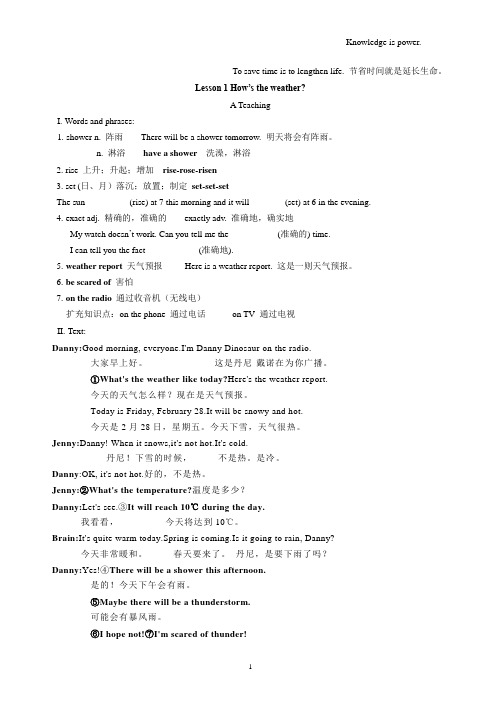
To save time is to lengthen life. 节省时间就是延长生命。
Lesson 1 How’s the weather?A TeachingI.Words and phrases:1.shower n. 阵雨There will be a shower tomorrow. 明天将会有阵雨。
n. 淋浴have a shower洗澡,淋浴2. rise 上升;升起;增加rise-rose-risen3. set (日、月)落沉;放置;制定set-set-setThe sun _________ (rise) at 7 this morning and it will _______ (set) at 6 in the evening.4.exact adj. 精确的,准确的exactly adv. 准确地,确实地My watch doesn’t work. Can you tell me the __________ (准确的) time.I can tell you the fact ___________ (准确地).5.weather report天气预报Here is a weather report. 这是一则天气预报。
6.be scared of 害怕7.on the radio通过收音机(无线电)扩充知识点:on the phone 通过电话on TV 通过电视II.Text:Danny:Good morning, everyone.I'm Danny Dinosaur on the radio.大家早上好。
这是丹尼·戴诺在为你广播。
①What's the weather like today?Here's the weather report.今天的天气怎么样?现在是天气预报。
Today is Friday, February 28.It will be snowy and hot.今天是2月28日,星期五。
人教新版英语八年级下册Unit-1-What’s-the-matter第一单元导学案
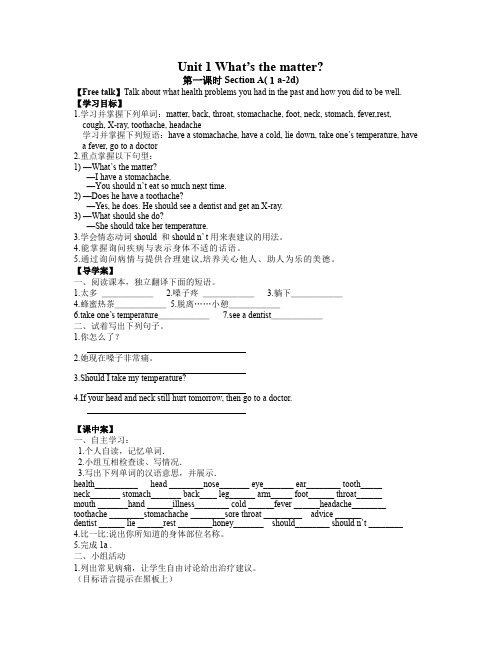
Unit 1 What’s the matter?第一课时Section A(1a-2d)【Free talk】Talk about what health problems you had in the past and how you did to be well. 【学习目标】1.学习并掌握下列单词:matter, back, throat, stomachache, foot, neck, stomach, fever,rest, cough, X-ray, toothache, headache学习并掌握下列短语:have a stomachache, have a cold, lie down, take one’s temperature, havea fever, go to a doctor2.重点掌握以下句型:1) —What’s the matter?—I have a stomachache.—You should n’t eat so much next time.2) —Does he have a toothache?—Yes, he does. He should see a dentist and get an X-ray.3) —What should she do?—She should take her temperature.3.学会情态动词should 和should n’ t用来表建议的用法。
4.能掌握询问疾病与表示身体不适的话语。
5.通过询问病情与提供合理建议,培养关心他人、助人为乐的美德。
【导学案】一、阅读课本,独立翻译下面的短语。
1.太多______2.嗓子疼______3.躺下______4.蜂蜜热茶______5.脱离……小憩______6.take one’s temperature______7.see a dentist______二、试着写出下列句子。
新外研版八年级英语下册导学案-Module 5 Cartoons(Unit1-Unit3)

外研版八年级英语下册导学案Module 5 CartoonsUnit 1 It’s time to watch a cartoon.一、学习目标:1.一般现在时、一般过去时和现在完成时的区别。
2.能听懂和阅读关于介绍卡通片的语言材料,能通过相关词汇和图片描述自己和他人的对卡通片的观点;能编写关于卡通片的对话。
3.学会倾听他人的对卡通片的看法;养成关心、帮助他人的良好品质;认识到动画片的悠久和灿烂。
二、重点及难点:三种时态的区分。
三、学习步骤:Step 1 Lead-in1. Ss watch the video and answer “What’s this cartoon about?”.2. Ss look the pictures and answer the questions.Do you know this cartoon?What’s the name of the cartoon?What do you think of the cartoon?Step 2 New wordsLook and say. The teacher shows the pictures of new words and let the students to say as quickly as possible.1. cartoon n.漫画;动画片2. handsome adj. 英俊的3. smart adj. 聪明的4. sky n. 天空5. cool adj. 酷的6. hero n. 英雄;男主角7. humorous adj. 幽默的8. laugh v. 笑9. lesson n.经验;教训Step 3 Answer the questions1.What kind of cartoons do you like?2.Do cartoons always end in a happy way?3.What cartoons do you think are funny?Step 4 Listening1. Listen to Part 2 and find out Betty’s and Tony’s answers to the questions in Activity 1.brave, cartoon, cute, funny, handsome, smart2. Now work in pairs and check. Do they like the same cartoons as you?3. Listen to Part 3 and answer the following questions.1) Wh at are Tony and Daming talking about?2) What does Daming think is better?Answers: 1. They are talking about cartoons.2. He thinks Superman is better.Step 5 Reading1.Now answer the questions.1. What does Tony think about Spiderman?2. Why does Daming think Superman is better?3. Why do they both like Tom and Jerry?4. What lesson can Tony learn from Tom and Jerry?Answers: 1. Spiderman can’t fly, but he climbs up buildings with his hands and feet. That’scool.2. Becaus e he’s stronger th an Spiderman. He can fly though the skyand fight badpeople.3. Because Tom and Jerry are very funny.4. They fight a lot, but t hey really love each other.Step 6 Everyday EnglishLet Ss say what they have learnt in the passage.Step 7 Language pointsSs should master the main points from the passage in Part 3.If possible, let the students to say at first.1. Do cartoons always end in a happy way? 卡通片常以快乐的方式结束吗?in a … way 表示“以一种…的方式”。
八年级英语下册全册导学案
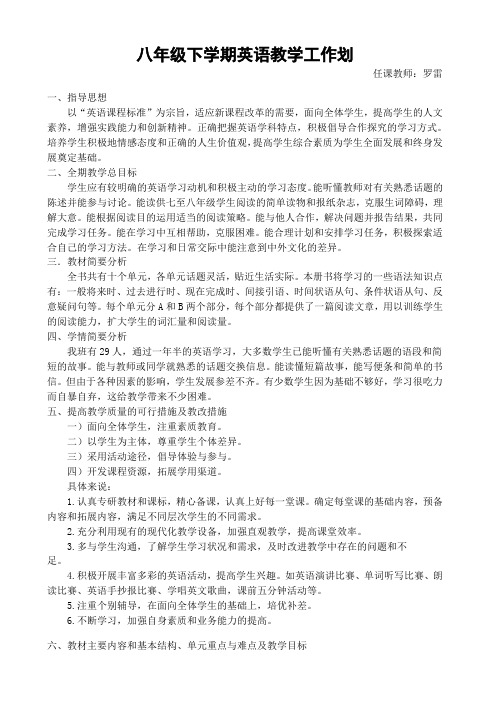
八年级下学期英语教学工作划任课教师:罗雷一、指导思想以“英语课程标准”为宗旨,适应新课程改革的需要,面向全体学生,提高学生的人文素养,增强实践能力和创新精神。
正确把握英语学科特点,积极倡导合作探究的学习方式。
培养学生积极地情感态度和正确的人生价值观,提高学生综合素质为学生全面发展和终身发展奠定基础。
二、全期教学总目标学生应有较明确的英语学习动机和积极主动的学习态度。
能听懂教师对有关熟悉话题的陈述并能参与讨论。
能读供七至八年级学生阅读的简单读物和报纸杂志,克服生词障碍,理解大意。
能根据阅读目的运用适当的阅读策略。
能与他人合作,解决问题并报告结果,共同完成学习任务。
能在学习中互相帮助,克服困难。
能合理计划和安排学习任务,积极探索适合自己的学习方法。
在学习和日常交际中能注意到中外文化的差异。
三.教材简要分析全书共有十个单元,各单元话题灵活,贴近生活实际。
本册书将学习的一些语法知识点有:一般将来时、过去进行时、现在完成时、间接引语、时间状语从句、条件状语从句、反意疑问句等。
每个单元分A和B两个部分,每个部分都提供了一篇阅读文章,用以训练学生的阅读能力,扩大学生的词汇量和阅读量。
四、学情简要分析我班有29人,通过一年半的英语学习,大多数学生已能听懂有关熟悉话题的语段和简短的故事。
能与教师或同学就熟悉的话题交换信息。
能读懂短篇故事,能写便条和简单的书信。
但由于各种因素的影响,学生发展参差不齐。
有少数学生因为基础不够好,学习很吃力而自暴自弃,这给教学带来不少困难。
五、提高教学质量的可行措施及教改措施一)面向全体学生,注重素质教育。
二)以学生为主体,尊重学生个体差异。
三)采用活动途径,倡导体验与参与。
四)开发课程资源,拓展学用渠道。
具体来说:1.认真专研教材和课标,精心备课,认真上好每一堂课。
确定每堂课的基础内容,预备内容和拓展内容,满足不同层次学生的不同需求。
2.充分利用现有的现代化教学设备,加强直观教学,提高课堂效率。
新外研版八年级英语下册导学案Module 10-On the radio(Unit1-Unit3)

外研版八年级英语下册导学案Module10 On the radioUnit1 I hope that you can join us one day一、学习目标:1.知识目标:(1)掌握下列词汇:director, avoid, background, background, national, international, interview, on air, presenter(2)掌握下列句型及短语:①Thank you for showing us around.②When it’s o n, it means we’re on air.③Come this way.④It gets crazy in here.⑤show sb. around ⑥on air⑦avoid doing sth.⑧make noise ⑨in the backgroun⑩ keep studying2.能力目标:能够听懂和读懂在广播中常用的词汇、短语和句型,并将节目与常用词汇对应起来。
3.情感目标:初步了解新闻传媒,了解媒体人的工作。
二、学习重、难点:1.重点:掌握宾语从句,掌握动词后接(to)+v.或v.ing的形式。
2.难点:掌握动词(to)+v.或v.ing的形式作宾语三、自主学习:1.词汇速记引领,带领(v)________ 避免,防止(v)________背景(n)__________国家的,国内的(adj)______direct(v) → _____(n)导演,主管,经理present(v) → __________(n)主持人2.短语互译be on________ avoid doing sth___________ make noise_____________come this way_____________ over there______________带某人参观______________(广播或电视)播出_________________四、学习过程:Step1. Warming-upFree talk: Do you listen to the radio?Do you like listening to the sports news programme?Do you like listening to the news programme?Do you like listening to music?Which presenter do you like best?Step2.Pre-listening1.Listen and check(√ ) the types of news you hear.culture government sports weather2.Listen again and complete the sentences.(1)Zhang Li reads ______________________________________ on Radio Beijing.(2)The president of Russia will stay in China for________________.(3)The match is between _______________and_________________.Step3.Fast-listeningListen and answer:1.What should we avoid doing in the background?2.Do they collect the latest national and international news in the newsroom?Step4.Careful-listeningListen again and complete the notes.1.When the red light is on,it means______________________________________.2.We collect_____________________________and write reports in the newsroom.3.You should________________________________if you want to be a presenter.4.This is also where we_________________________with the big sports stars.plete the sentences with the words in the box.1.Newspaper and television programmes often have__________with famous people.2.More and more ___________students are coming to China to learn Chinese.3.Every country has its own ________hero—a person who did something very important for the country and its people.4.Try to_______drinking too much tea or coffee, or you will not be able to sleep well.5.Could you speak a l ittle bit louder,please?It is very noisy in the ________________.Step6.Work in pairs.Ask and answer questions about the radio.1.What do you like listening to?2.What do you not like listening to?3.What programme did you listen to the last time you turned on the radio?4.What do you need to do if you want to be a presenter?nguage points.1.show v. 引领,带领【语境领悟】*Thank you for showing us around. 感谢你带领我们参观。
新外研版八年级英语下册导学案-Module 4-Seeing the doctor(U1-U3)
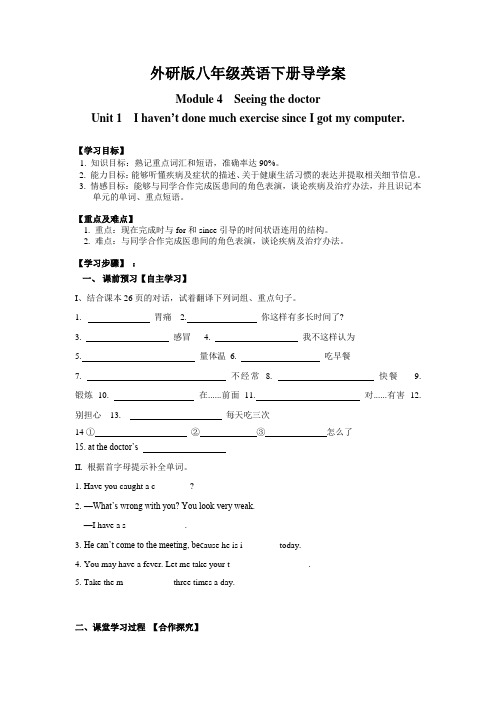
外研版八年级英语下册导学案Module 4 Seeing the doctorUnit 1 I haven’t done much exercise since I got my computer.【学习目标】1. 知识目标:熟记重点词汇和短语,准确率达90%。
2. 能力目标:能够听懂疾病及症状的描述、关于健康生活习惯的表达并提取相关细节信息。
3. 情感目标:能够与同学合作完成医患间的角色表演,谈论疾病及治疗办法,并且识记本单元的单词、重点短语。
【重点及难点】1. 重点:现在完成时与for和since引导的时间状语连用的结构。
2. 难点:与同学合作完成医患间的角色表演,谈论疾病及治疗办法。
【学习步骤】:一、课前预习【自主学习】I、结合课本26页的对话,试着翻译下列词组、重点句子。
1.胃痛2. 你这样有多长时间了?3. 感冒4. 我不这样认为5. 量体温6. 吃早餐7. 不经常8. 快餐9. 锻炼10. 在......前面11. 对......有害12. 别担心13. 每天吃三次14 ①②③怎么了15. at the doctor’sII. 根据首字母提示补全单词。
1. Have you caught a c________?2.—What’s wrong with you? You look very weak.—I have a s_____________ .3.He can’t come to the meeting, bec ause he is i________ today.4.You may have a fever. Let me take your t__________________.5. Take the m___________ three times a day.二、课堂学习过程【合作探究】Step1 Match the words in the box with the pictures.cough fever headachestomach ache toothacheStep2 Listen and check (√) what’s wrong with Betty and Daming.Betty Damingcoughfeverheadachestomach achetoothacheStep3. Complete the passage with the words in the box.cough fever health stomachache temperatureIt is easy to look after your (1) _______. Just do some exercise, such as running. Do not eat fast food! It may give you a (2) ___________. Most illnesses are not dangerous but when you catch a cold or get a (3) _______, you may also get a (4) _______. This means your (5) ___________ is higher than usual. You must go to the doctor.Step4. Listen and ch eck (√)what’s wrong with Betty and Daming.(Activity 2)Step5. III. Listen and complete the table about Daming.Illness (1) and .How long (2)For about .Why (3)①food and no .②He spendsin front of the .What to do (4)First, stop eating and.Second, get some .Take some a day.Step6. Listen and notice the intonation1. How can I help you?2. How long have been like this?3. Have you caught a cold?4. Do you do any exercise?分析: 英语有两种基本语调:升调和降调。
最新人教版八年级英语下册导学案(全册 共10个单元)
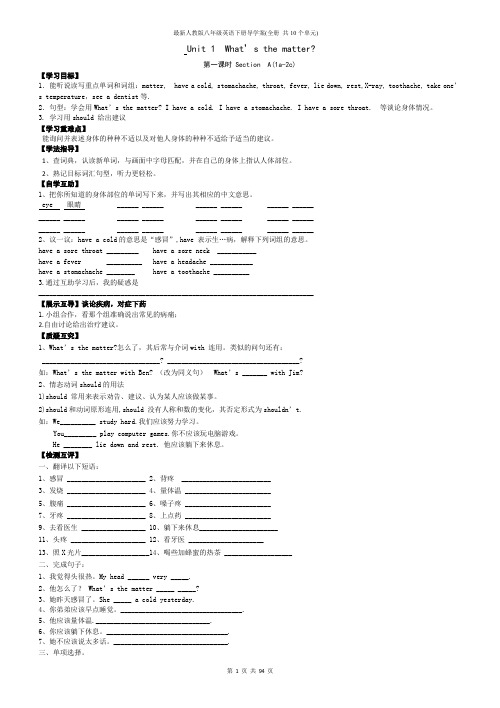
Unit 1 What’s the matter?第一课时 Section A(1a-2c)【学习目标】1.能听说读写重点单词和词组:matter, have a cold, stomachache, throat, fever, lie down, rest,X-ray, toothache, take one’s temperature,see a dentist等.2.句型:学会用What’s the matter? I have a cold. I have a stomachache. I have a sore throat. 等谈论身体情况。
3. 学习用should 给出建议【学习重难点】能询问并表述身体的种种不适以及对他人身体的种种不适给予适当的建议。
【学法指导】1、查词典,认读新单词,与画面中字母匹配,并在自己的身体上指认人体部位。
2、熟记目标词汇句型,听力更轻松。
【自学互助】1、把你所知道的身体部位的单词写下来,并写出其相应的中文意思。
eye 眼睛 ______ ______ ______ ______ ______ ____________ ______ ______ ______ ______ ______ ______ ____________ ______ ______ ______ ______ ______ ______ ______2、议一议:have a cold的意思是“感冒”,have 表示生…病,解释下列词组的意思。
have a sore throat _________ have a sore neck ___________have a fever __________ have a headache ____________have a stomachache ________ have a toothache __________3.通过互助学习后,我的疑惑是_____________________________________________________________________________【展示互导】谈论疾病,对症下药1.小组合作,看那个组准确说出常见的病痛;2.自由讨论给出治疗建议。
新外研版八年级英语下册导学案Module 6-Hobbies (Unit1-Unit3)

外研版八年级英语下册导学案Module 6 HobbiesUnit 1 Do you collect anything?学校________ 班级________ 姓名________一、学习目标:1、知识目标:①通过自主学习,掌握本单元的词汇及短语。
2、能力目标:①能辨别多种爱好。
②能咨询他人爱好,介绍自己的爱好。
并发表看法。
3、情感目标:培养对他人不同爱好的尊重,维持良好的人际关系。
二、重点及难点1、重点:词汇和短语。
2、难点:能够熟练交流自己及其他人的爱好。
三、学习步骤【课前自学】1、看Module1Unit1的词汇表,学会拼读单词并牢记。
2、阅读课本P2,理解activity3的对话内容,并画出重点短语和难句。
【课文导学】一.Greeting.:Talk about the winter vacation:How was your winter vacations?What did you do during the vacation?Are you interested in …?What did your father/ mother often do ?Did he / she do it all the time?So his / her hobby is to ….二、翻译下列单词和短语1. stamp_____2.collect_______3 least_______4.interview______5.成功_________6.收拾________7.占用_________8.对······感兴趣_________9.在···的末尾________10.照看_________11.a bit_____12 all the time_____三、听力训练完成听力练习1,听材料一完成a12,听材料二,完成a4 ,再听一遍,将文中不明白的地方标出四、重点句型:1.Which hobby do you think takes up the least space? ( Unit 1, P2)takes up 表示“占据时间或空间”。
人教版八年级英语下册Unit 1 Grammar导学案
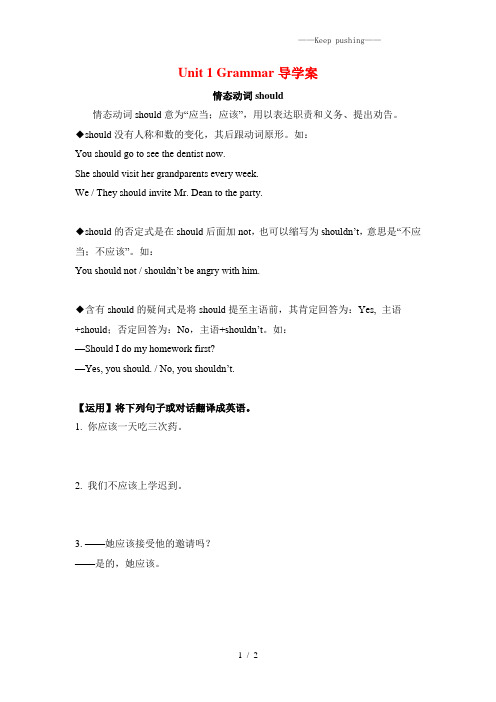
Unit 1 Grammar导学案情态动词should情态动词should意为“应当;应该”,用以表达职责和义务、提出劝告。
◆should没有人称和数的变化,其后跟动词原形。
如:You should go to see the dentist now.She should visit her grandparents every week.We / They should invite Mr. Dean to the party.◆should的否定式是在should后面加not,也可以缩写为shouldn’t,意思是“不应当;不应该”。
如:You should not / shouldn’t be angry with him.◆含有should的疑问式是将should提至主语前,其肯定回答为:Yes, 主语+should;否定回答为:No,主语+shouldn’t。
如:—Should I do my homework first?—Yes, you should. / No, you shouldn’t.【运用】将下列句子或对话翻译成英语。
1. 你应该一天吃三次药。
_____________________________________2. 我们不应该上学迟到。
_____________________________________3. ——她应该接受他的邀请吗?——是的,她应该。
_____________________________________答案1. You should take the medicine three times a day.2. We shouldn’t arrive late for school.3. —Should she accept his invitation?—Yes, she should.教师的职务是‘千教万教,教人求真’;学生的职务是‘千学万学,学做真人’。
新外研版八年级英语下册导学案Module 1(Unit 1~Unit 3)

外研版 八年级英语下册导学案Module 1 Feelings and impressionsUnit 1 It smells delicious.【学习目标】1. 知识目标:能够正确运用表示感觉和知觉的系动词,并且识记本单元的单词、重点短语: Smell, soft, sour, lovely, try, have a try, sound, salt,favourite 等等。
2. 能力目标:能够听懂本单元中表示感觉和知觉的系动词(sound, smell, look,taste, feel)表述的内容并能与图片匹配。
3. 情感目标:通过学习表达对事物的感觉能够更好地理解别人,从而更懂得关爱别人。
【重点及难点】1. 重点:掌握句子的系表结构:linking verb+adj. (系动词+形容词)。
2. 难点:运用表示感觉和知觉的系动词表达对事物的感觉。
【学习步骤】 :一、 课前预习【自主学习】I 、完成下列关于五官及其感觉的图示:We use our eyes / noses / hand s / mouths / ears to …Five senses ,, , , eye, lookII.结合课本2页的对话,试着翻译下列词组、重点句子。
1.①②想要做某事2. 在顶部3. 恐怕4. ①②一点儿5. 做完了6. 试试看7. 在中间8. 对甜食的爱好9. 确信10. 草莓酱11. 今天是我的幸运日二、课堂学习过程【合作探究】Step 1. Read the conversation on page 2, and complete the table.food How ... ?looks so nice ,smellstastessmells ,tastestastefeel in the middlesoundcaketastestastesStep 2. Practise speaking like this:E.g. The pizza looks/smells/tastes...【归纳总结】上述句子中的look、smell、taste、feel、sound 叫做,他们与be动词一样也被叫做系动词。
八年级英语导学案Unit1Lesson1 What’s the weather like
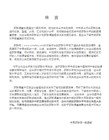
Lesson1 What’s the weather like ?学(学习目标)【学习目标】1. 掌握的词汇:rather storm rise (rose \risen) set2. 识别的词汇及短语:thunder sunrise sunset能力目标:能灵活运用所学词汇和句型描述各种天气情感目标:learn to make a weather report教学重点:重点短语和句型What’s the weather like ?It will be …/It is …What’s the temperature?教学难点: to make a weather report测(基础知识)1读课文,勾画出文中的重难点和疑难点,准备与同学共同探讨(1.)a weather report _____________(2.)degrees ________________ (3.)clouds__________ (4.)rather__________ (5.)shower_________ (6 )a thunder storm_________2 Read the text again and find out some useful expressions:on the radio_______________ (2)go down____________(3)come up__________________(4)相当凉爽___________________(5)我不希望如此________________(6)听我说_____________________(7)a good weather reporter_______________ (8)a weather report____________3. Read the text again and find out the meaning of the sentences: (小组展示)Is it going to rain today, Danny?_______________________________There will be some showers this afternoon._______________________________________Tell us what time it will rise and set!(4) It is ten degrees ____________________________(5) I hope not ____________________(6) )I am scared of thunder.________________________教(重难点)单词和词语探究snow课文原句:It’s not snowing. (2)There is some snow on the grass. (3)It will be snowy.思考:snow 有几种词性?______________________________________________Scared 课文原句:I’m scared of thunder!思考:你能写出同义句吗?________________________________________be scared/afraid to do sth 意为“害怕做某事”be scared/afraid that 后接句子rather课文原句:It’s rather cool today, isn’t it? 这是个反义疑问句,由两部分组成,中间用逗号隔开。
步步为赢导学案英语人教版八年级下Unit1
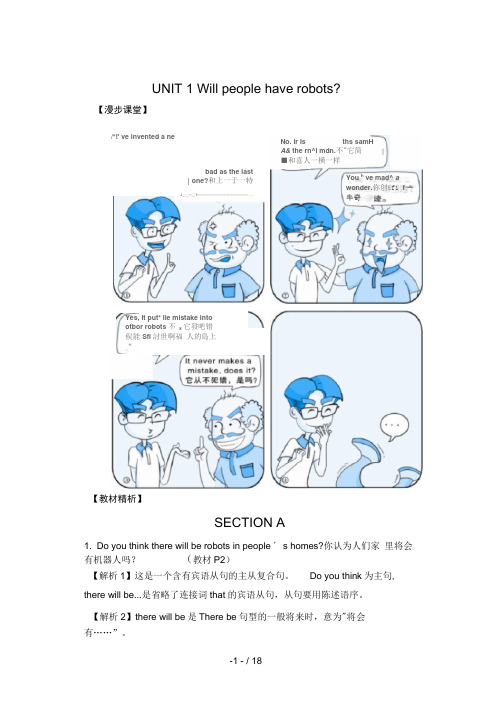
UNIT 1 Will people have robots?【漫步课堂】【教材精析】SECTION A1. Do you think there will be robots in people ' s homes?你认为人们家 里将会有机器人吗? (教材P2)【解析1】这是一个含有宾语从句的主从复合句。
Do you think 为主句, there will be...是省略了连接词that 的宾语从句,从句要用陈述语序。
【解析2】there will be 是There be 句型的一般将来时,意为"将会 有……”。
/*!' ve invented a ne No. ir Is ths samHA& the rn^i mdn.不"它简■和喜人一橫一样bad as the last| one?和上一于一特J_-_—_ t -------------------------------------- … You h ve mad^ a wonder.你创£fi f 一牛奇Yes, it put* ile mistake intootbor robots 不 H 它發吧错俣能Sfl 討世啊福 人的島上“There will be a football match in Bird Nest this Sunday. 周日在鸟巢将有一场足球比赛。
There won ' t be Kung Fu Panda 2 in the cinema tomorrow. 明天在这家电影院不会上映《功夫熊猫2》。
—Will there be more trees in the future?将来会有更多的树吗?—Yes, there will./No, there won ' t.是的,会有。
/不,不会。
There be句型的时态变化:一般现在时:There is/are... 一般过去时:There was/were...一般将来时:There will is/are going to be...2. Everything will be free. 一切事物都将是免费的。
Unit 1分层导学案 2021--2022学年八年级英语下册

班级:姓名:____________Unit 1 What’s the matter?Section A(1a—2d)第一课时主备人:王*庆【学习目标】知识目标:掌握本节的生词和句型。
能力目标:能够听懂医生和病人之间的对话。
知识目标:掌握本节的生词和部分重点句型。
---What’s the matter? ---I have a stomachache.---What’s the matter with you? ---I cut myself.能力目标:能模仿医生和病人之间的对话。
知识目标:掌握本节的生词和重点句型。
---What’s the matter? ---I have a toothache.---What should I do? ---You should drink some hot tea with honey.能力目标:能够扮演医生或者病人的角色进行语言演练。
【课前热身】任务一:请写出下面的身体部位名词胳膊___ 耳朵___ 后背___ 眼睛___ 脚___ 手___ 头___腿_____ 嘴巴___ 脖子_____ 鼻子_____ 胃部_____ 牙齿_____任务二:1. have a toothache2. have a stomachache3. have a backache4. have a headache5. h ave a sore throat6. have a fever7. have a cold 8. lie down and rest9. drink hot tea with honey 10. drink lots of water11. see a dentist 12. take one’s temperature13. go to a doctor你怎么了?我头疼/胃疼/牙疼。
________________? _____________________.【听课疑问】(请同学将听课中自己的问题和不清楚的地方及时记在导学案上)问题1:问题2:【教师答疑】【当堂检测】I.根据句意及汉语提示写出所缺的单词1.Lisa didn't go to school because she had a ________ (头痛).2.3.The man had a ________ (咳嗽) last night, so he didn't sleep well.4.I'm not feeling well. I have a ________ (胃痛).5.hen you have a ________(发烧), you should go to a doctor.6.Go and ________ (躺) down for a while.II.用括号内的适当形式填空。
Module1 Unit1导学案2021-2022学年外研版八年级英语下册
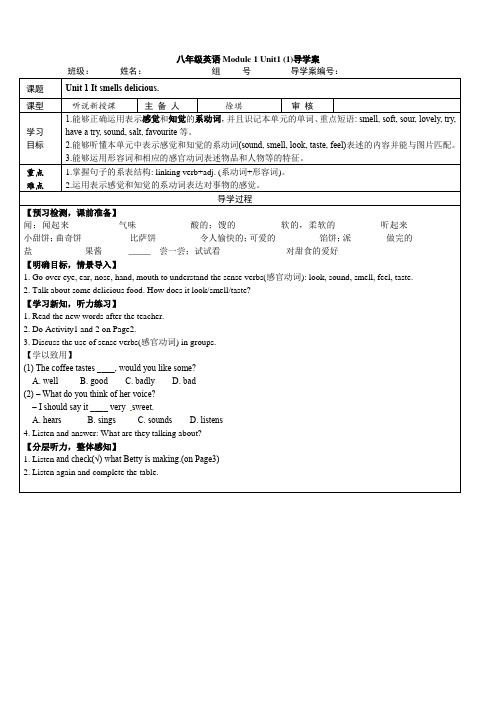
八年级英语Module 1 Unit1 (1)导学案班级:姓名: _____组_____号导学案编号:课题Unit 1 It smells delicious.课型听说新授课主备人徐琪审核学习目标1.能够正确运用表示感觉和知觉的系动词,并且识记本单元的单词、重点短语: smell, soft, sour, lovely, try, have a try, sound, salt, favourite等。
2.能够听懂本单元中表示感觉和知觉的系动词(sound, smell, look, taste, feel)表述的内容并能与图片匹配。
3.能够运用形容词和相应的感官动词表述物品和人物等的特征。
重点难点1.掌握句子的系表结构: linking verb+adj. (系动词+形容词)。
2.运用表示感觉和知觉的系动词表达对事物的感觉。
导学过程【预习检测,课前准备】闻;闻起来_________ 气味__________ 酸的;馊的________ 软的,柔软的________ 听起来___________ 小甜饼;曲奇饼_________ 比萨饼_________ 令人愉快的;可爱的_________ 馅饼;派_______ 做完的__________ 盐__________ 果酱___________尝一尝;试试看___________ 对甜食的爱好___________【明确目标,情景导入】1. Go over eye, ear, nose, hand, mouth to understand the sense verbs(感官动词): look, sound, smell, feel, taste.2. Talk about some delicious food. How does it look/smell/taste?【学习新知,听力练习】1. Read the new words after the teacher.2. Do Activity1 and 2 on Page2.3. Discuss the use of sense verbs(感官动词) in groups.【学以致用】(1) The coffee tastes ____, would you like some?A. wellB. goodC. badlyD. bad(2) – What do you think of her voice?– I should say it ____ very sweet.A. hearsB. singsC. soundsD. listens4. Listen and answer: What are they talking about?【分层听力,整体感知】1. Listen and check(√) what Betty is making.(on Page3)2. Listen again and complete the table.Food How...?pizza looks so nice and _________ smells _________tastes _________cheese smells _________ tastes _________________ taste ________feel in the middleapple pie sounds _________cakesugar tastes _______________ tastes sweet too.【细读文本,角色练习】1. Read by yourself and answer the questions.(1) Does Daming like the cheese? How do you know?(2) Who has a sweet tooth?2. Read the dialogue together with the tape recorder. Practise reading the dialogue in groups.【设置语境,知识导出】1. Try to retell the dialogue accordi ng to some pictures and the key words.2. Work in pairs. Ask and answer about the things in the box. Say why you like or do not like them. (Act.7)bananas flowers ice cream pop music silk T-shirtsA: Do you like bananas?B: Yes, I do. They taste delicious. Do you like flowers?八年级下英语当堂达标检测内容:Module1 Unit1 (1)姓名:____________ 班级:____________ 分数:____________一、短语默写。
人教版八年级英语下册导学案(知识点+练习题带答案)

初二英语下册导学案(知识汇总+练习题)Unit 1单词matter [ˈmætə] v. 重要,要紧,有关系What’s the matter? 怎么了?出什么事了?sore [sɔ:(r)] adj. 疼痛的,酸痛的have a cold 感冒stomach ['stʌmək] n. 胃,腹部stomachache ['stʌməkeɪk] n. 胃痛,腹痛have a stomachache 胃痛foot(复数feet) [fu:t] n. 脚neck [nek] n. 颈,脖子throat [θrəʊt] n. 喉咙fever ['fi:və] n. 发烧,发热lie [laɪ] v. 躺,平躺lie down 躺下rest [rest] n. 剩余部分,其余;放松,休息cough [kɒf] n. & v. 咳嗽X-ray ['eksreɪ] n. X光,X射线toothache [ˈtu:θeɪk] n. 牙痛take one's temperature 量体温headache [ˈhedeɪk] n. 头痛have a fever 发烧break [breɪk] n. & v. 休息,暂停;打破take breaks (take a break)休息hurt [hə:t] v. 伤害,损害,使受伤,疼passenger ['pæsɪndʒə] n. 乘客,旅客off [ɒf] adv. prep. 离开(某处);从…去掉get off 下车to one's surprise 使…惊讶,出乎…意料onto [ˈɒntə] prep. 向,朝trouble [ˈtrʌbl] n. 麻烦,烦扰,问题hit [hit] n. & v. 碰撞,打,打击right away 立即,马上get into 陷入,参与herself [hə:ˈself]她自己,她本身(she的反身代词)bandage ['bændɪdʒ] n. & v. 绷带;用绷带包扎sick [sɪk] adj. 患病的,不适的knee [ni:] n. 膝盖nosebleed [ˈnəʊzbli:d] n. 鼻出血breathe [bri:ð] v. 呼吸sunburned [ˈsʌnbɜ:nd] adj. 晒伤的ourselves [ɑ:ˈselvz]我们自己(we的反身代词)climber [ˈklaɪmə(r)] n. 登山者be used to 习惯于… 适应于…risk [rɪsk] n. & v. 风险,危险;冒险take risks (take a risk) 冒险accident [ˈæksidənt] n. 意外事件;事故situation [ˌsitjuˈeiʃən] n. 状况,形式,情况kg=kilogram [ˈkɪləgræm] n. 公斤,千克rock [rɔk] n. 岩石run out (of) 用尽,耗尽knife [naif] n. 刀,餐刀cut off 切除blood [blʌd] n. 血mean [mi:n] v. 意味着,意思是,意欲get out of 离开,从… 出来importance [ɪmˈpɔ:tns] n. 重要性decision [dɪ'sɪʒn] n. 决心,决定,抉择control [kən'trəʊl] v. 控制,支配,操纵be in control of 掌管,管理spirit ['spɪrɪt] n. 勇气,意志death [deθ] n. 死亡give up 放弃nurse [nə:s] n. 护士Unit1 知识梳理【重点单词】matter [ˈmætə] v. 重要,要紧,有关系What’s the matter? 怎么了?出什么事了?sore [sɔ:(r)] adj. 疼痛的,酸痛的have a cold 感冒stomach ['stʌmək] n. 胃,腹部stomachache ['stʌməkeɪk] n. 胃痛,腹痛have a stomachache 胃痛foot(复数feet) [fu:t] n. 脚neck [nek] n. 颈,脖子throat [θrəʊt] n. 喉咙fever ['fi:və] n. 发烧,发热lie [laɪ] v. 躺,平躺lie down 躺下rest [rest] n. 剩余部分,其余;放松,休息cough [kɒf] n. & v. 咳嗽X-ray ['eksreɪ] n. X光,X射线toothache [ˈtu:θeɪk] n. 牙痛take one's temperature 量体温headache [ˈhedeɪk] n. 头痛have a fever 发烧break [breɪk] n. & v. 休息,暂停;打破take breaks (take a break)休息hurt [hə:t] v. 伤害,损害,使受伤passenger ['pæsɪndʒə] n. 乘客,旅客off [ɒf] adv. prep. 离开(某处);从…去掉get off 下车to one's surprise 使…惊讶,出乎…意料onto [ˈɒntə] prep. 向,朝trouble [ˈtrʌbl] n. 麻烦,烦扰,问题hit [hit] n. & v. 碰撞,打,打击right away 立即,马上get into 陷入,参与herself [hə:ˈself] pron. 她自己,她本身(she 的反身代词)bandage ['bændɪdʒ] n. & v. 绷带;用绷带包扎sick [sɪk] adj. 患病的,不适的knee [ni:] n. 膝盖nosebleed [ˈnəʊzbli:d] n. 鼻出血breathe [bri:ð] v. 呼吸sunburned [ˈsʌnbɜ:nd] adj. 晒伤的ourselves [ɑ:ˈselvz] pron. 我们自己(we的反身代词)climber [ˈklaɪmə(r)] n. 登山者be used to 习惯于… 适应于…risk [rɪsk] n. & v. 风险,危险;冒险take risks (take a risk) 冒险accident [ˈæksidənt] n. 意外事件;事故situation [ˌsitjuˈeiʃən] n. 状况,形式,情况kg=kilogram [ˈkɪləgræm] n. 公斤,千克rock [rɔk] n. 岩石run out (of) 用尽,耗尽knife [naif] n. 刀,餐刀cut off 切除blood [blʌd] n. 血mean [mi:n] v. 意味着,意思是,意欲get out of 离开,从… 出来importance [ɪmˈpɔ:tns] n. 重要性decision [dɪ'sɪʒn] n. 决心,决定,抉择control [kən'trəʊl] v. 控制,支配,操纵be in control of 掌管,管理spirit ['spɪrɪt] n. 勇气,意志death [deθ] n. 死亡give up 放弃nurse [nə:s] n. 护士【重点短语】1.have a fever 发烧2.have a cough 咳嗽3.have a toothache 牙疼4.talk too much 说得太多5.drink enough water 喝足够的水6.have a cold 受凉;感冒7.have a stomachache 胃疼8.have a sore back 背疼9.have a sore throat 喉咙痛10. take risks 冒险11.hot tea with honey 加蜂蜜的热茶12.see a dentist 看牙医13.get an X-ray 拍X 光片14.take one’ s temperature 量体温15.put some medicine on sth. 在……上面敷药16. give up 放弃17. sound like 听起来像18. all weekend 整个周末19. in the same way 以同样的方式20. go to a doctor 看医生21. go along 沿着……走22. on the side of the road 在马路边23. shout for help 大声呼救24. without thinking twice 没有多想25. get off 下车26. have a heart problem 有心脏病27. to one’ s surprise 另某人惊讶的是28. thanks to 多亏了;由于29. in time 及时30. make a decision 做出决定31. get into trouble 造成麻烦32. right away 立刻;马上33. because of 由于34. get out of 离开;从……出来35. keep on doing sth. 继续或坚持做某事36. put a bandage on sth. 用绷带包扎37. fall down 摔倒38. feel sick 感到恶心39. have a nosebleed 流鼻血40. cut his knee 割伤他的膝盖41. put her head back 把她的头向后仰42. have problems breathing 呼吸困难43. mountain climbing 登山运动44. be used to doing sth. 习惯做某事45. run out (of) 用完;用尽46. so that 以便47. so...that... 如此……以至于...…48. be in control of 掌管;管理49. in a difficult situation 在闲境中【重点句型】1. What's the matter with you?= What'the trouble with you?= What's wrong with you? 你怎么了?2. What should she do? 她该怎么办呢?3.Should I take my temperature? 我应该量一下体温吗?4.You should lie down and rest. 你应该躺下休息一会儿。
- 1、下载文档前请自行甄别文档内容的完整性,平台不提供额外的编辑、内容补充、找答案等附加服务。
- 2、"仅部分预览"的文档,不可在线预览部分如存在完整性等问题,可反馈申请退款(可完整预览的文档不适用该条件!)。
- 3、如文档侵犯您的权益,请联系客服反馈,我们会尽快为您处理(人工客服工作时间:9:00-18:30)。
Unit 1 What’s the matter?第1课时Section A 1a-2c【学习目标】1.能听说读写重点单词和词组:matter, sore, have a cold, stomachache, have a stomachache, foot, neck, stomach, throat, fever, lie, lie down, rest, cough, X-ray, toothache, take one’s temperature,see a dentist2.句型:学会用What’s the matter? I have a cold. I have a stomachache.I have a sore back. I have a sore throat. 谈论身体情况。
3. 学习用should 给出建议【重点】【难点】能询问并表述身体的种种不适以及对他人身体的种种不适给予适当的建议。
【自学指导】1,自己认读1a单词,与画面中字母匹配,并在自己的身体上指认人体部位。
2,对照单词表翻译1a画面上的句子,并读熟。
(5分钟)【自学检测】1、把你所知道的身体部位的单词写下来,并写出其相应的中文意思。
__eye_ __眼睛_ ______ ______ ______ ______ ______ ______ ______ ______ ______ ______ ______ ______ ______ ______ ______ ______ ______ ______ ______ ______ ______ ______ ______ ______ ______ ______ ______ ______ ______ ______ 2、have a cold的意思是―感冒,着凉‖为固定词组,have 表示生…病,解释下列词组的意思。
have a sore throat _________ have a sore neck ___________have a fever ____________ have a headache ____________have a stomachache ________ have a toothache __________【合作探究】1、What’s the matter?怎么了,其后常与介词with连用。
类似的问句还有:_________________________ _________________________What’s the matter with Ben? (改为同义句)What’s _______ w ith Jim?2、情态动词should的用法1)should 常用来表示劝告、建议、认为某人应该做某事。
2)should 本身不能单独作谓语,必须和动词原形连用。
should 没有人称和数的变化,其否定形式为shouldn’t.如:We__________ study hard. 我们应该努力学习。
You_________ play computer games. 你不应该玩电脑游戏。
He ________ lie down and rest. 他应该躺下来休息。
【达标检测】一、翻译以下短语:1、感冒______________________2、背疼_________________________3、发烧______________________4、量体温________________________5、腹痛______________________6、嗓子疼________________________7、牙疼______________________ 8、上点药________________________9、去看医生___________________ ___________________________10、躺下来休息__________________ 11、头疼_____________________12、看牙医_____________________ 13、照X光片____________________14、喝些加蜂蜜的热茶________________________二、完成句子:1、你怎么了?What’s the matter _____ you?2、他怎么了?What’s the matter _____ _____?3、她昨天感冒了。
She _____ a cold yesterday.4、Mary咳嗽。
Mary ____________________.5、我觉得头很热。
My head ______ very _____.6、你应该回家休息。
__________________________________.7、她不应该说太多话。
________________________________.8、你弟弟应该早点睡觉。
__________________________________.9、--他应该量体温吗?___________________________?--是的。
_____,____________.10、你看起来不太好。
_____________________.三、单项选择。
1.单选题:( )①What’s ____ with you? A. trouble B. the matter C. the wrong D. matter ( )②— ______? — Nothing serious, but a bit tired. —Better have a rest now, dear.A. Is that allB. Is there anything elseC. What’s thisD. What’s the matter with you( )③—_________? —I have a headache and I don’t feel like eating anything.A. How are youB. What can I do for youC. What’s the matter with youD. How do you like it( )④【2011.云南昆明】27. —What’s the matter with Tina?—_______________.A. She is away.B. She is cool.C. She has a sore throat.D. She should take some medicine【总结反思】__________________________________________________________________________________________________________________【课后作业】1、熟练说出本课重点短语和重点句型,并一次。
2、根据2a、2b 编5组对话,并和同桌练熟。
第2课时Section A 2d,GF--4c【学习目标】1、重点单词:headache, break, hurt, herself,2、短语:have a fever, take breaks/take a break, in the same way, go to a doctor.3、句型:Are you OK? Do you have a fever? Yes, I do. /No, I don’t.What should she do? She should take her temperature.Should I put some medicine on it? Yes, you should. /No, you shouldn’t.【重点】使用should, shouldn’t给出合理的建议。
【难点】根据不同的病症给出多个合理建议。
【自学指导一】自读对话2d两次,把握大意,划出不懂之处并自己查字典解决。
4分钟。
【自学检测一】完成下列句子。
1、你还好吗?Are you _____?2、我该怎么办?_____ should I _____?3、我应该量体温吗?Should I ____ ___ _____?4、我头疼。
I have ___ _____.5、你周末做什么了? What_____ you_____ on the _________?6、你应该离开电脑休息一下。
You need to _____ ________ ______ _______ the computer.7、我认为你应该躺下来休息。
I think you should ______ ______ and rest.【合作探究一】1、小组成员轮流读对话并翻译,划出疑难准备提问。
2、共同划出你们认为重要的短语、句子,写在小黑板上。
3、组内演练对话。
【自学指导二】自读GF两次,弄懂含义。
【合作探究二】1、组内熟读GF并演练对话。
3、共同划出你们认为重要的短语、句子,写在小黑板上。
2、独立完成4a、4b,小组内互相检查,解决疑难。
4、总结各种疾病以及相对应的建议,准备4c的活动。
【达标检测】一、短语翻译:1、休息_______________2、没有移动____________3、以相同的方式_____________4、听起来像_____________5、割伤自己_________________6、让自己受伤____________________7、在伤口上敷点药________________________ 8、跌倒__________________二、单项选择。
1、( ) I didn’t sleep well last night, because I _____ a toothache .A. wasB. wentC. hadD. took2、( ) —Tony, What’s ___ matter with you?— I have _____ toothache.A. a; theB. the; aC. /; theD. the; /3、( ) Mr. Smith eats ______ food, so he’s _____ fat.A .much too; too muchB .too many; much tooC. too much; too muchD. too much ;much too4、( )—Why are you so tired these days? —Well, I have ________ homework to do.A. too muchB. too many C . much too D. many too5、( ) You ____ be quiet when you are in the reading room.A. shouldB. shouldn’tC. canD. can’t6、( ) You _____ drive your car so fast. It’s very dangerous.A. wouldn’tB. shouldn’tC. couldn’tD. mightn’t7、( ) David needs ______ a good rest. A. has B. to have C. have D. to has8、( ) — I'd like a cup of black coffee. What about you, Maggie?— I prefer coffee ________ sugar.A. thanB. forC. withD. to9、( ) The boy isn’t ___ to dress himse lf. A. old enough B. enough old C. old10、( ) —I’m sorry to break your pen. —_______A. That’s rightB. It doesn’t matterC. Thank you【总结反思】_________________________________________________________【课后作业】1、完成导学方案Unit 1 A部分。
